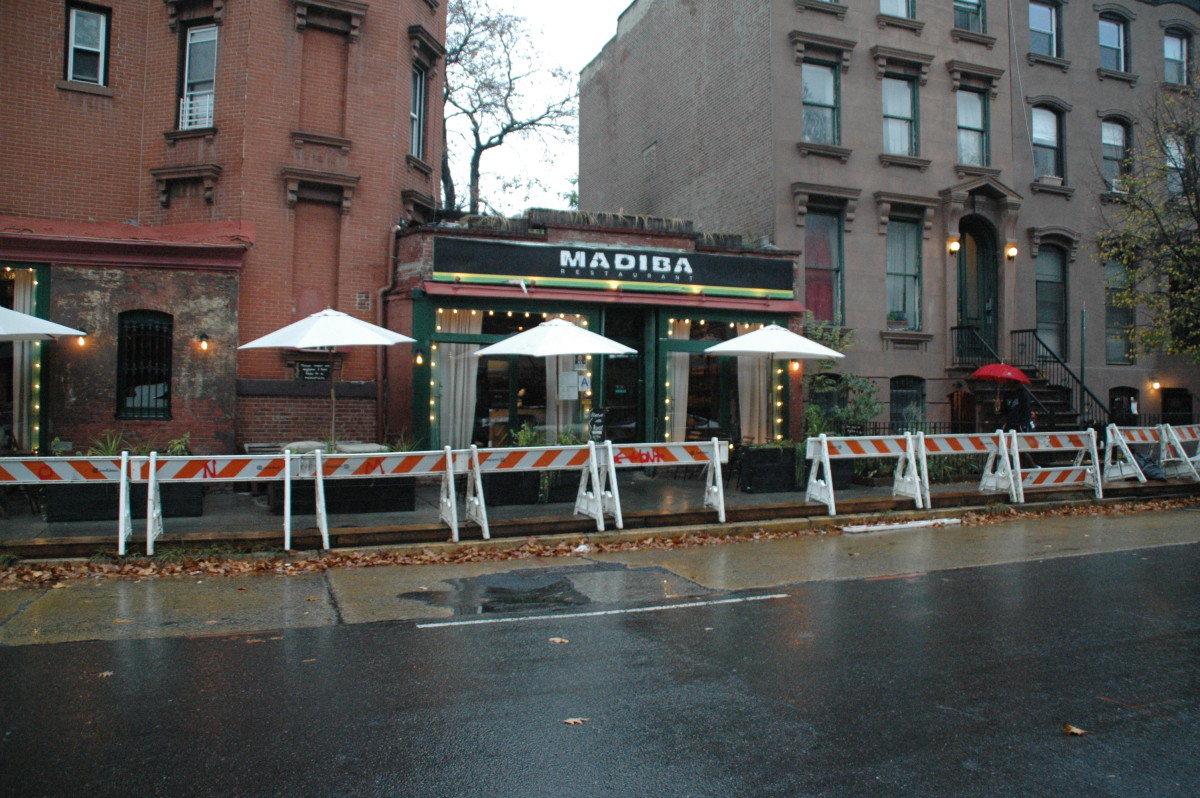Nearly 100 protestors gathered with South African flags and signs on a cold afternoon in late October. But they didn’t protest in front of a government building or tourist attraction, they stood outside Madiba Restaurant, a trendy but laid back establishment on DeKalb Avenue.
The protestors had been invited by the restaurant to rally against the South African government’s proposal to raise tuition fees at universities across that country. The fee increase sparked widespread outrage across South Africa and thousands young people at South African universities sparred with riot police.
The Brooklyn branch of the protest, though, was cordial and polite, and the gathering spot was a host, not a target. “The restaurant is political,” said Madiba’s owner, Mark Henegan, 47, who moved from South Africa to the U.S. 27 years ago. “It’s a tribute to Mandela, a tribute to Obama.” Madiba, in fact, is Nelson Mandela’s clan name and is considered a term of affection in South Africa.

In South Africa last month, thousands of students organized protests through social media after the government announced an 11.5% hike in university fees. The fee increase would significantly impact the ability for many black students to attend college, exacerbating race and class divides throughout the country. After weeks of pressure, South African President Jacob Zuma changed course and cancelled the proposed fee increase.
The idea for the Brooklyn protest didn’t originate with Henegan. “I organized the protest with two of my other friends,” Lwando Ncetshana, 29, said. “Mark is always open to the South African community in a variety of ways.” Ncetshana came to the U.S. at age 18 when she was unable to afford an education in South Africa. She worked as an au pair and saved up money for college. “I see a lot of people who I love and care about not able to go to school or they go for semester and drop out,” Ncetshana said. “I cannot truly enjoy what I get in life. Their struggles become my struggles.”
When New York South Africans in Solidarity reached out and wanted to create awareness on the mass student protests, Henegan was happy to oblige. The tuition protest isn’t the restaurant’s first foray into political activism. Henegan was an early supporter of Barack Obama and put up a mural of the then-Illinois senator long before he won the Democratic nomination. “When I put up the Obama sign people said it would deter business,” Henegan said. “The Obama thing was actually big for the restaurant, business increased because I was involved in the community. We were the hub of Obama’s campaign and we had people out drumming on the street when he won.”
Henegan recently declared Madiba a “toupee-free zone” after Donald Trump’s comments about Mexicans. That didn’t deter business either. “There aren’t a lot of Republicans in Brooklyn,” Henegan said. The Fort Greene establishment’s progressive bent is immediately apparent on its Facebook page, too; the profile picture is an image of Bernie Sanders.
But the restaurant maintains a friendly vibe. Patrons high-five the bartender as they arrive on a wet afternoon for some Jameson. The customers are a diverse mix of black and white South African expats, twenty-somethings and middle-aged couples. “Madiba is seen as a bit of refuge for South Africans around New York,” protestor Joanne Beckwith, 28, said. “There was talk of why didn’t we take the protest to the embassy or Times Square, but the organizers thought Madiba was appropriate for a South African event.”
The efforts of organizers drew people from outside of the South African community to Fort Greene. Robert Robinson, 32, is a former educator and current graduate student who knew nothing about South Africa before a friend informed him about the protest. “I wanted to raise my voice in solidarity with South African students, but I had to look up the song lyrics on Wikipedia,” Robinson said.
Education inequality is a massive issue in South Africa. Although the fee increase was cancelled, Beckwith, an education researcher at Teachers College, points out that white males continue to dominate academia and black students graduate with dim career prospects. According to Beckwith, nearly one million students fail to graduate high school each year. “With this momentum we will begin to see a lot more changes, students and parents demanding a better education,” Beckwith said.
In South Africa, the protests, which garnered international attention, took place at universities with more white students, like the University of Cape Town. “Nobody really paid attention until the white universities started to protest,” Ncetshana said.
Henegan, whose restaurant has served Archbishop Desmond Tutu and President Zuma, will continue to use Madiba as a platform for political issues. He had a relatively liberal upbringing in apartheid South Africa and says he came to the United States illegally in 1987 to get away from apartheid. He was an illegal alien for seven years and was unable to vote until just before the 2008 election. Immediately he began knocking on doors for the Obama campaign in Ashville, North Carolina, where he was living at the time.
Nelson Mandela is the ultimate inspiration behind Henegan’s willingness to open his doors to protest and political action. Henegan credits Mandela’s willingness to accept all races after the fall of apartheid as a model that everyone should follow. Though the protest is good for business, Henegan says he doesn’t judge Madiba’s success based on money.
“It gives me gratification that I created a place of love,” he says. “Seeing my restaurant filled with all colors is how I judge success.”


Leave a Reply